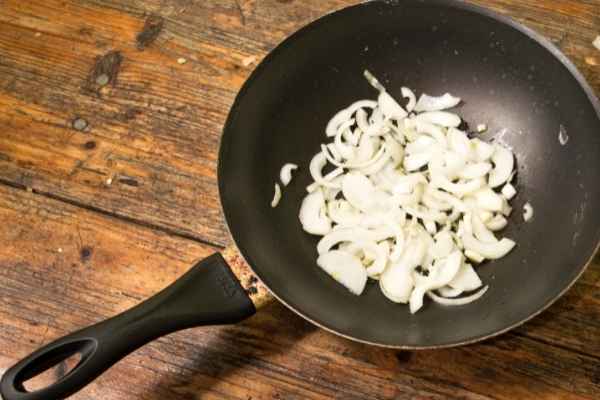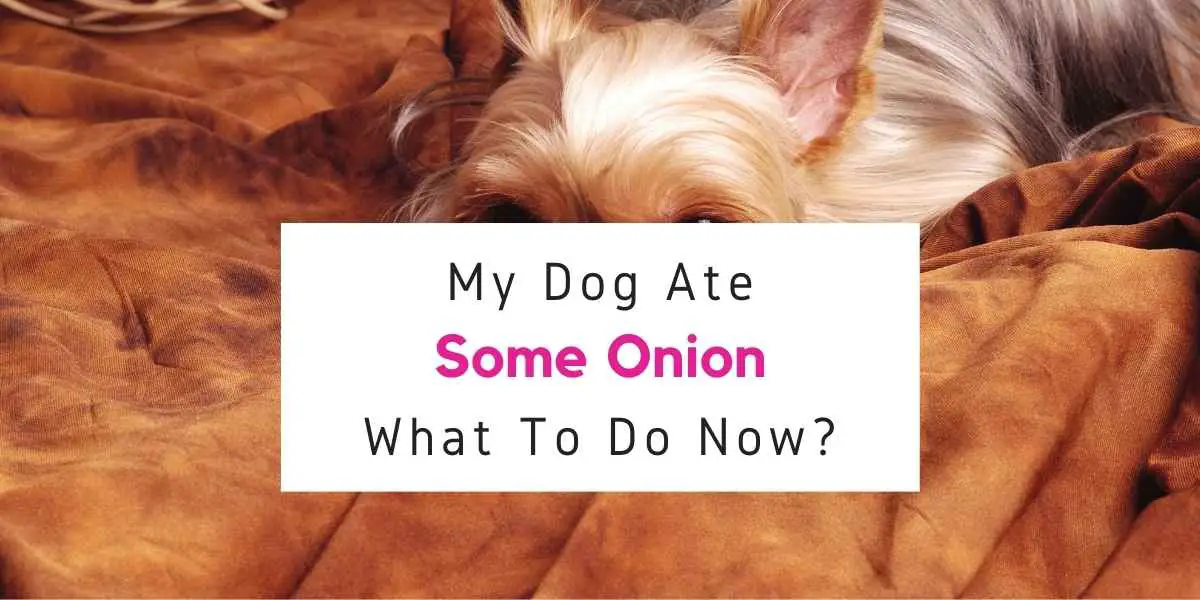I was chopping my onion and my dog decided to take a bite. What should I do now?
This is a question that many of my clients have asked me recently, so I decided to write this blog post about what you should do if your dog eats onion.
- Can Dogs Eat Onions?
- Can Dogs Eat Cooked Onions?
- Will A Small Amount Of Onion Hurt My Dog?
- How Much Onion Does It Take To Hurt A Dog?
- What Part Of Onion Is Harmful To Dogs?
- What Should I Do If My Dog Ate Some Onion?
- Symptoms Of Onion Poisoning In Dogs
- How To Diagnose Onion Poisoning In Dogs
- What Should I Do If My Dog Ate Onion And Is Overweight?
- What Causes Onion Allergies In Dogs?
- How To Prevent Onion Allergies In Dogs?
- How To Treat Onion Allergies In Dogs?
- Healthy Vegetables For Dogs
- Conclusion
Can Dogs Eat Onions?

Though onions are a part of the Allium family, which includes both plants and vegetables that some animals can eat and others cannot, according to WebMD, they are not recommended for dogs.
When it comes to garlic and onions, make sure you read the label before you take anything from your garden out to pet your pooch.
If any animal is on medication or has any health problems – especially as serious as gastrointestinal issues – they will typically be advised by their vet not to have these in their diet.
Can Dogs Eat Cooked Onions?

Some dogs can eat cooked onions but some can’t.
Some breeds of dogs, such as Greyhounds, are very sensitive to the sulfur compounds found within a typical onion and may have allergic reactions that result in vomiting or diarrhea when they ingest such foods.
Feeding your dog imperfectly cooked onions could also be toxic to them as well. At best it would cause them stomach pains and possibly loose stool.
If you’re cooking vegetables that contain notable amounts of sulfur-rich vegetables like an onion for dinner, it’s a good idea to prevent your canine companion from feasting on the too delicious seasonal veggies.
Will A Small Amount Of Onion Hurt My Dog?
It may, yes.
Onions are toxic to dogs because they contain a substance called N-propyl disulfide, which causes hemolytic anemia in mammals.
Although not all breeds of dogs seem equally susceptible to this onion toxicity, there appears to be some genetic linkage between certain breeds and onion sensitivity – especially the Dachshunds and German Shepherds.
When it comes to onions and dogs, moderation is key as too much can cause everything from mild stomach upset (vomiting) or diarrhea on higher doses of ingestion.
How Much Onion Does It Take To Hurt A Dog?
Some people would say not a whole onion. For dogs, again largely the size of the dog and weight of the onion is going to be what really determines it.
Based on its acidic properties (similar to tomato) I can’t imagine it being good for them in large quantities.
Humans handle acidic compounds through tiny amounts, but if you’re cooking with a large number of onions as part of your dish then your pet won’t need much else to get sick from that.
What Part Of Onion Is Harmful To Dogs?
The Allicin in the onion is what dogs react to.
It’s true that dogs can eat a lot of things that are bad for them, but most EMTs (EMTs) wouldn’t recommend letting your dog eat raw onions or garlic simply because they can cause very serious damage.
What Should I Do If My Dog Ate Some Onion?
1. Stop feeding him anything that contains onion for the next twelve hours. This means staying away from any raw or cooked onions, soups with garlic, tapenade, marinara sauce, and bread with onion powder in it.
2. Give him a tablespoon of canned pumpkin mixed into his food to coat his stomach lining which should keep him from vomiting (make sure he has access to water).
3. Place yarrow leaves on either side of your dog’s mouth so he can chew and swallow them as a natural emetic and throat soother (note: do not put anything else in your dog’s mouth including peanut butter or poorly chewed pieces of bread).
4. Make him drink plenty of water.
Symptoms Of Onion Poisoning In Dogs
In large quantities, onion can be toxic to your dog.
Signs of onion poisoning in dogs include weakness and depression, excessive drooling and panting, vomiting, diarrhea (may be bloody), yellowish skin, and whites of the eyes.
The symptoms can range from mild to severe depending on how much onion is consumed by the animal.
Left untreated, however, more than 50% of cases result in fatality so seek veterinary attention immediately if you suspect your pup has overeaten some onions!
Some dogs are especially sensitive to large doses of raw onions for unknown reasons but even small amounts may have health consequences for those with pre-existing conditions such as diabetes or heart disease.
Mild enough signs may only appear several hours after ingestion, so it’s important to keep a close eye on your dog and call the vet if his condition worsens.
How To Diagnose Onion Poisoning In Dogs
Although it’s more common for cases of onion poisoning to happen in humans, the same risk factors and symptoms apply to pets as well.
Contact your veterinarian immediately if you see any signs of onion poisoning in your pet such as drooling, vomiting, panting, wheezing followed by lethargy, and lack of appetite.
The veterinarian will likely do blood tests like a full chem panel or urine test for fasting glucose levels.
They will also recommend kitty treats that are safe for pets to eat such as chicken broth or ice cream (plan ahead!).
If there is a lot of liver damage done then a prednisone shot may be recommended.
Lastly, they may want to rule out other more serious animal illnesses such as pancreatitis.
What Should I Do If My Dog Ate Onion And Is Overweight?
A dog who has eaten a large amount of onion and is overweight may experience more severe symptoms.
Call your veterinarian if they eat raw onions or garlic, as these foods can cause very serious damage to the liver in some animals however this effect isn’t always seen in less overweight animals.
What Causes Onion Allergies In Dogs?
Dogs with pre-existing allergies to onions are at risk for onion allergy and should avoid contact with it altogether if they can’t take an antihistamine like Benadryl or the steroid prednisone which will help reduce inflammation in their bodies, but this is only a temporary solution.
How To Prevent Onion Allergies In Dogs?
If your dog has shown no signs of onion poisoning or allergy but you suspect that they still have a sensitivity to it then keep them away from any foods with high levels of onion, garlic, and other spices such as curry powder.
If their symptoms are mild enough start by only feeding them bland foods like boiled chicken, rice, and water for 48 hours.
How To Treat Onion Allergies In Dogs?
If your dog has a severe onion allergy then they need to see the vet as soon as possible or else their symptoms will worsen immensely.
This is because an animal with allergies needs treatment in order to lower swelling of their airways and remove allergens from their system.
This is done through antibiotics, antihistamines, cortisone shots, steroids to reduce inflammation in the body as well as decongestants like pseudoephedrine which help stimulate airway passages so my dog can breathe better.
Healthy Vegetables For Dogs
Your dog’s digestive system doesn’t break down many vegetables.
If a vegetable is healthy for people, then it will probably be too hard on your pup’s digestion.
Things that are good for dogs to eat include carrots (raw or cooked), green beans (cooked), and cauliflower (cooked).
Fruits such as blueberries, raspberries, pineapple, blackberries, and strawberries are also suitable choices.
But apples should be peeled since they contain more sugar content than other fruits.
Good protein sources include eggs from poultry such as chicken or turkey and lean cuts of beef like roast beef or ground beef with the fat trimmed off of it.
Milk in moderation is fine but put a bowl of cream in front of them and if they drink it then they can have a little bit.
Conclusion
You may be wondering what to do if your dog has eaten an onion?
First, you should determine how much onion the pup ingested.
It is possible that a small amount of onion will not cause any harm; but for safety sake, it is always better to err on the side of caution and call your vet.
If the dog ate more than one clove (which equates to about 2-3 grams), then vomiting can occur in as little as 30 minutes after ingestion, and death could happen within 12 hours.
For all cases where there was an exposure, monitor your pet closely for signs of distress or other medical problems such as diarrhea or severe abdominal pain which are both indicators that surgery may need to follow.

